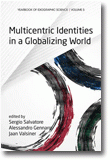
Multicentric Identities in a Globalizing World
Edited by:
Sergio Salvatore, University of Salento
Alessandro Gennaro, University of Salento
Jaan Valsiner, Niels Bohr Professor of Cultural Psychology, Aalborg University
A volume in the series: Yearbook of Idiographic Science. Editor(s): Sergio Salvatore, University of Salento. Jaan Valsiner, Niels Bohr Professor of Cultural Psychology, Aalborg University.
Published 2014
The volume represents the continuing of a the Yearbook of Idiographic Science project, born in 2009 and developed through an annual series of volumes collecting contributes aimed at developing the integration of idiographic and nomothetic approaches in psychology and more in general social science.
This year's YIS project received many positive feedbacks and signals of interest, as well as several submissions, from many parts of the world. This fifth volume directs attention to relevant and actual psycho-social phenomena as the development of identity in terms of self identity, social identity and local.
identity
The volume is directed to students, researchers and clinicians, interested in deepenig theoretical and methodological issues and improve clinical practices and research cultures.
CONTENTS
Introduction: Self-Regulation by Signs: A Social Semiotic Approach to Identity, Mariann Märtsin. SECTION I: PLURALISM OF PERSONAL ANCHORAGES. Gender Identity in Intersex Adults: The Interplay of Voices and Silences, Ana Karina Canguçú-Campinho, Ana Cecília de Sousa Bastos, and Isabel Maria Sampaio Oliveira Lima. Successive Ruptures in Maternal Identity: The Recurrent Abortion and the Implications for the Self, Vívian Volkmer Pontes. Health Professionals Die Too: How an Anesthesiologist Looks at Death in Palliative Care Practice, Olga V. Lehmann and Emanuela Saita. Section I Commentary: Modern Qualitative Approach to Psychology: Art or Science? Aaro Toomela. SECTION II: IDENTITY IN MOVEMENT THROUGH CONTEXT. Identity and Organizations: Articulations from Social Networks Studies, Antonio Virgílio Bittencourt Bastos, Ana Clara de Sousa Bastos, and Ingrid Rapold. Through the Professional Role to the World of New Meanings, Katrin Kullasepp. Family Business Dynamics: Generational Change as Identity Transition, Ruggero Ruggieri and Nadia Pecoraro. Being Online: An Idiographic Approach to Identity in Virtual Environments, Beatrice Ligorio, Feldia Loperfido, and Marianna Iodice. Section II Commentary The Identity as a System of Translation of the Boundary between Subject and Context, Maria Francesca Freda and RaffaeleDe Luca Picione. SECTION III: GENERALIZED MULTIPLICITY. Sustaining Identity Change Through the Use of Symbolic Resources: The Case of an Immigrant Living in Greece, Irini Kadianaki. Negotiating Identities in Immigrant Families: Indian Muslim Youth in the United States of America, Sujata Sriram. Representations and Social Belonging: An Idiographic Approach to Community and Identity, Gordon Sammut, Mohammad Sartawi, Marco Giannini, and Chiara Labate. Performing Ethics at Identity Crossroads, Alberto Rosa and Fernanda González. Territorial Identity and Immigration: Some Empirical Evidence on How They Are Related in Rome, Fabio Pollice, Francesca Spagnuolo, and Giulia Urso. Dynamics of Identity Re-Definitions among Refugees, Hala W. Mahmoud. Section III Commentary Being on the Move: How Borders Help to Re-Think Identity, Giuseppina Marsico. About the Contributors.
REVIEWS
"Theories, methodologies, and epistemologies grounded in mainstream psychology privilege the experimental method across disciplines to center the normative, generalizable, and universal in the study of human behavior. Nowhere is this grand narrative more visible than in education where theories of child development, behaviorism, and psychometrics dominate the field. Sergio Salvatore, Alessandro Gennaro, and Jaan Valsiner's edited volume Multicentric Identities in a Globalizing World comprises a diverse collection of global scholarship that disrupts some of the major tenets of the grand narrative of mainstream psychology. The text advances the idiographic turn in the qualitative study of human behavior with implications for a wide range of disciplines such as education." Suniti Sharma Saint Joseph's University in Teachers College Record (Read full review)
-
Paperback9781623967178
Web price: $62.04 (Reg. 72.99)
-
Hardcover9781623967185
Web price: $89.24 (Reg. 104.99)
- eBook9781623967192

- PSY000000 - PSYCHOLOGY: General
- EDU000000 - EDUCATION: General
- EDU029040 - EDUCATION: TEACHING METHODS & MATERIALS: Social Science
-
 (Re)Envisioning Social Studies Education Research
Current Epistemological and Methodological Expansions, Deconstructions, and Creations
(Re)Envisioning Social Studies Education Research
Current Epistemological and Methodological Expansions, Deconstructions, and Creations
-
 Idiographic Approach to Health
Idiographic Approach to Health
-
 Making Sense of Infinite Uniqueness
The Emerging System of Idiographic Science
Making Sense of Infinite Uniqueness
The Emerging System of Idiographic Science
-
 Methods of Psychological Intervention
Methods of Psychological Intervention
-
 One Dog Is Enough
Ivan P. Pavlov’s Contributions to Idiographic Science
One Dog Is Enough
Ivan P. Pavlov’s Contributions to Idiographic Science
-
 Reflexivity and Psychology
Reflexivity and Psychology
-
 Ten Years of Idiographic Science
Ten Years of Idiographic Science

